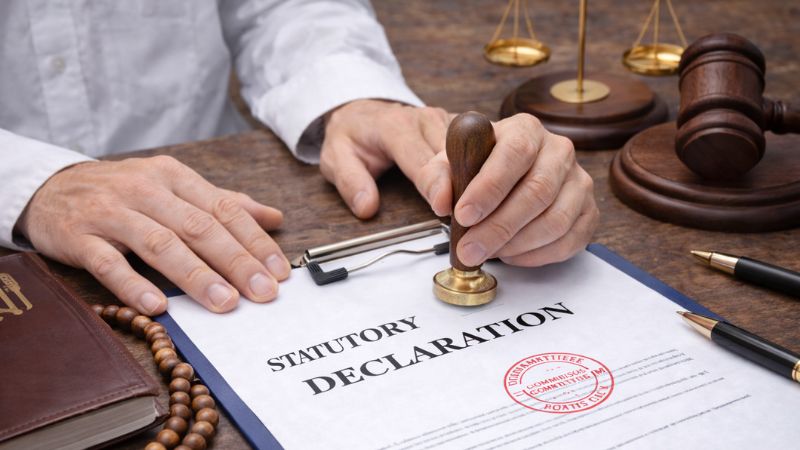In Muslim law, statutory declarations are essential legal tools required in multiple cases where someone needs to make an official statement about certain facts or circumstances. At the same time, Singaporean law recognises Islamic practices by allowing Muslims to affirm a statutory declaration instead of taking an oath. In this article, we discuss common situations where you may need to make a statutory declaration for the Syariah Court and explain how to prepare one in Singapore.
Key Takeaways
- Statutory declarations are official statements declaring something to be true.
- Instead of making statutory declarations under oath, Muslims affirm them in line with Islamic practice and the amended Oaths and Declarations Act.
- Common uses of statutory declarations in Syariah law practices include marriage registration, divorce, inheritance, and other matters.
- When making a statutory declaration, you need to make it in writing and sign it before a Commissioner for Oaths.
Understanding Statutory Declarations in Syariah Law in Singapore
In Singapore, statutory declarations have the same legal effect in both civil and Syariah law. A statutory declaration is a statement declaring something to be true, made according to the Oaths and Declarations Act.
When you make a statutory declaration, you need to do it in writing, using a statutory declaration form provided in the First Schedule of the Oaths and Declarations Act. After you fill in the form, you need to sign your statutory declaration before a Commissioner for Oaths. If you make a statutory declaration as a Muslim, you may affirm it instead of making an oath by using the words “solemnly, sincerely and truly declare and affirm” instead of the word “swear”.
Common Uses of Statutory Declarations in Syariah Law
In the Syariah Court, statutory declarations serve as evidence in various legal matters, including marriage, divorce, inheritance, and other family law issues.
Statutory Declarations at Marriage Registration
During Muslim marriage registration, both the groom and the bride make statutory declarations to affirm that:
- there are no impediments to their marriage,
- they are both willing to marry, and
- all information in their marriage application is true.
Making Statutory Declarations for Divorce in Syariah Court
In Muslim divorce, the couples typically go through a mediation session before the hearing, especially if there are minor children, in which case mediation is mandatory. If the divorce proceeds to the pre-trial conference stage, the husband and wife will need to file and exchange affidavits on evidence-in-chief and make statutory declarations as required by court procedure.
Filing an Application for an Inheritance Certificate
When Muslims seek inheritance under Faraid, they need to apply for an Inheritance Certificate. One of the critical steps in applying for the Inheritance Certificate is making a statutory declaration to demonstrate their relationship with the deceased. The statutory declaration, along with supporting documentation, serves as critical proof in deciding the distribution of the estate.
Statutory Declarations in Other Syariah Court Matters
In Syariah Court proceedings, statutory declarations are used to establish facts in various applications and cases. Most often, these include applications for amendments or corrections of court orders, changes of particulars, guardianship, custody, maintenance, and other legal matters.
How to Make a Muslim Statutory Declaration in Singapore
When making a statutory declaration for Syariah Court proceedings, you need to go through several key steps:
- Get a Statutory Declaration Form: You can obtain the statutory declaration form related to your application on the Syariah Court portal, if available, or from your chosen Commissioner for Oaths.
- Fill in the Statutory Declaration: You need to enter your statements into the statutory declaration form and have it ready for signing.
- Meet with the Commissioner for Oaths: Since the law requires statutory declarations to be affirmed and signed before a Commissioner for Oaths, you need to choose one and make an appointment.
- Sign and Affirm the Statutory Declaration: When you meet with the Commissioner for Oaths, they will verify your identity and witness your signing and affirmation of the statutory declaration.
Conclusion
Muslim statutory declarations in Singapore are important legal instruments to support your applications with the Syariah Court in all types of family matters and other proceedings. You need to make your statutory declaration in writing in the standard form as provided in the Oaths and Declarations Act.
As a Muslim, you affirm a statutory declaration instead of making an oath and sign it before a Commissioner for Oaths. If you are interested in more information on Syariah Court statutory declarations or need to affirm and sign one, please don’t hesitate to contact IRB Law offices and make an appointment with our Commissioner for Oaths.
FAQs
Can a statutory declaration be made remotely?
The amendments to the Oaths and Declarations Act allow statutory declarations and certain oaths and affirmations to be taken remotely through live video link, live television link, or other digital means. If you are interested in remote signing and affirming a statutory declaration, please contact the IRB Law Commissioner for Oaths to arrange for this service.
What is the difference between a statutory declaration and an affidavit in Syariah Court cases?
Syariah Court documents in Singapore include both affidavits and statutory declarations. A Syariah affidavit in Singapore is a signed statement of fact made under affirmation. Meanwhile, a statutory declaration is a statement declaring something to be true. Both Muslim affidavits and statutory declarations must be made in writing and affirmed before a Commissioner for Oaths.
How to prepare a statutory declaration?
When making a Syariah Court statutory declaration, you need to obtain a written form for your matter, fill in your statement in the form, make an appointment with a Commissioner for Oaths, and sign and affirm the statutory declaration before the Commissioner.





